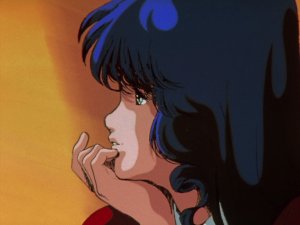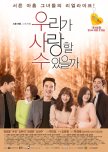Romance has never been my favorite genre. While I always welcome a good love story, I prefer them interspersed between other elements. Should I be caught with a rom-com, it’s usually safe to bet I’m watching with a friend—or the cast drew my attention. In the case of “Can We Love?” both eventualities came to pass. However, unexpectedly, this drama became a weekly pleasure; I even felt compelled to share it with others via an article. What about “Can We Love?” sparked this romance madness in me? Well, let’s see….
Though Jung Wan (Eugene) might be considered a traditional heroine, there are actually three leading ladies. Each woman has her own fully realized plot, with journeys so unique from the others (yet still connected!) that they could stand as three separate dramas. Does this result in a disjointed feeling? Not at all! The writers have a talent for seamless transitions, balancing characters and their evolving circumstances from episode to episode. Instead of being drawn out forever, even conflicts were frequently solved within an episode or two (crazy, I know).
This isn't true of the entire drama unfortunately; I could practically feel the steam seep out around near in late episodes. While not nearly enough to derail the entire experience, some cliches and melodramatics slithered in, while other bits were managed a little awkwardly.
A big pro for “Can We love?” is realism, despite obvious exaggeration here and there for entertainment’s sake. These characters have mundane worries for the most part (such as money trouble, single-parenthood, or romantic uncertainty). They have their foibles and quirks, but even at their worst they’re never the maniacs one often encounters in similar dramas. The second female lead will not be hitting her rival with a car, here, folks. You’ve probably met or heard of people like the “antagonists” in this drama…though in the case of a certain abusive mother-in-law, I hope not.
But for me, honestly, the best part must be the romance. Great kisses abound, with actual moving lips and touching. Because the characters are adults and act as such, they’re not mortified by the prospect of sex (pre-martial or otherwise). Couples communicate, both to solve problems and to build intimacy and knowledge of one another. The "main" pairing even felt like they were actually in love. I admit to giddiness with certain scenes, an uncommon occurrence.
Uhm Tae Woong was a primary source for such giddiness, as fast-talking charmer Oh Kyung Soo. Discard thoughts of him from other dramas, those intense and serious men; this role is completely the opposite. A “world-famous director,” Kyung Soo flirts, teases, and pursues what he wants with sincerity—whether in work or love. You might fall a little in love yourself, however your tastes run; he might be my favorite leading man to date. Leading lady Eugene embodies a gentle presence, easily becoming a sympathetic lead in Jung Wan. Her chemistry with Uhm Tae Woong sparkles, and her mothering scenes are fantastic.
Also notable: Kim Yoo Mi presents a complex and controversial Sun Mi. This actress masterfully handles tough, flawed women with hidden vulnerabilities. Choi Jung Yoon capably maneuvers the emotional tribulation and wide nuances required of Ji Hyun, though the character did not satisfy my interest as much as others. Kim Sung Soo (gentle and mature Do Young) and Park Min Woo (puppy-eyed noona killer Yoon Suk) round out the cast quite well.
What about the music? I found it above average, often memorable and always well-placed. While there isn’t a false note in the bunch, certain songs might wax repetitive for some viewers. The vocals are where the soundtrack really shines: “Everyday” (GGot Jam Project), “I Want to Love Again” (Lunafly), and
“My Hero” (Kim Ji Sook) are all excellent examples. Others include “Softly” (Sum & So Yeon), and a more elusive track, known affectionately to viewers during the drama’s run as the “Hey, Boy” song. You’ll know when you hear it.
Considerați utilă această recenzie?























